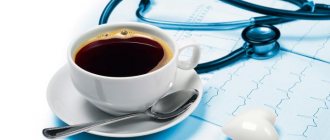How coffee affects the body
The composition of coffee beans is unique, and it is this that explains how a person feels after drinking the drink. The beans contain a natural biostimulant - caffeine, which gives vigor and freshness of thoughts. In addition, the composition contains proteins, amino acids, and polysaccharides, which are necessary for health.
But everything should be in moderation. If you drink a lot of coffee at once, the body will begin to malfunction, and signs of an overdose of caffeine and other active substances will appear.
It has been proven that a person whose body is relatively healthy by drinking coffee in moderation receives benefits. What does coffee do?
- It has a stimulating effect on brain activity, which speeds up thinking.
- Speeds up the metabolism in the body, which helps with weight loss, and in principle is good for the body.
- A person who drinks coffee is able to process the information received faster.
- General muscle tone increases after a cup of coffee.
- Hormones that are responsible for vigor and pleasure - dopamine, adrenaline and serotonin - begin to be produced more actively.
- Digestion improves.
- Blood circulates more actively.
The beneficial effects can only be felt with moderate consumption of the drink and using only natural grains for brewing. What happens if you drink a lot of coffee?
Lethal dose of coffee
Children, pregnant women, and people with cardiovascular diseases are at risk of caffeine overdose. Nursing women should use the drink with caution (no more than 200 mg of caffeine per day). For children and adolescents, a daily dose of 3 mg of caffeine per 1 kg of body weight is recommended.
A lethal dose of coffee for a person weighing 70 kg for a single dose corresponds to 10-14 g of caffeine . But to the question “can you die from coffee,” the correct answer is no, since to do this you will have to drink an unrealistic amount of liquid:
- brewed coffee contains 450 mg/l of caffeine, that is, the lethal dose for humans corresponds to 90 cups (240 g each);
- in an instant drink the concentration is lower: 300-400 mg/l, so you can get poisoned from about 120 mugs;
- for espresso with a high content of the substance (1700-2200 mg/l), the lethal dose is 100-130 cups (45 ml each);
- popular energy drinks contain on average 350 mg/l of the substance, and the lethal volume of the drink is about 120 cans (240 ml each);
- tea, depending on the variety and method of brewing, contains 180-420 mg/l of the substance, so you need to drink from 100 to 230 mugs to worry about the transition to another world;
- natural hot chocolate contains 430 mg/l of the substance, and the lethal dose is 97 cups (240 ml each);
- Cola contains an average of 100 mg/l of caffeine, and drinking 200 bottles at a time (500 ml each) is life-threatening.
What happens if you eat a spoonful of coffee? Drinking a large portion of instant coffee once increases body temperature - this is how the body reacts to concentrated caffeine. If you eat more than one teaspoon of coffee, but 2-3 at a time (without water, just chew and swallow), you can cause a temperature rise of up to 38 °C. The temperature will begin to rise within 20 minutes after consuming the granules, the effect will last no more than 40 minutes.
What happens if you drink a lot of coffee at once?
After drinking too much coffee once, a person begins to feel strange. The sensations are unpleasant and are associated with the accumulation of caffeine in the body. The action of the biostimulant begins approximately 15 minutes after drinking the drink. The peak is reached after forty minutes to an hour, and then begins to slowly subside.
It will take 4 to 6 hours for the caffeine resulting from drinking one cup of coffee to be completely neutralized. The interval between consumption of the drink should be at least 4 hours. What happens if you drink too much coffee in a row? There will definitely be an accumulation of excessive amounts of caffeine in the body, that is, an overdose.
They say that people with high blood pressure should not drink coffee.
This is a persistent stereotype. In fact, it is possible if you are used to drinking it and do not notice a deterioration in your health after drinking it.
Drinking coffee does increase blood pressure. Hence the feeling of cheerfulness. However, firstly, the pressure increases slightly (up to 10 mmHg). Secondly, not for long (for 10-15 minutes, and then it decreases on its own without additional manipulations). And only for those people who rarely drink coffee. If a person (even with hypertension) is used to drinking coffee every day, then he may not be afraid of a sudden increase in blood pressure. In general, there are no special restrictions on coffee consumption for people with hypertension, other than the standard recommendations for all healthy people (no more than 4 cups per day).
Overdose symptoms after drinking large amounts of coffee
If you drink not one, but several cups of espresso in a short period of time, the following symptoms will appear:
- trembling in hands;
- too fast heartbeat;
- the blood vessels of the brain will sharply narrow, you will feel tired, weak, and even fainting is possible (by the way, some people mistake such symptoms for a lack of energy and aggravate their situation by taking another portion of the biostimulant);
- possible diarrhea and nausea;
- dehydration, symptoms of which include dry mouth, confusion and dizziness;
- breathing becomes rapid and shallow, a feeling appears as if there is not enough air;
- a person begins to sweat even without physical activity.
You need to know moderation in everything. If you drink coffee and experience at least one of the above-mentioned sensations, then under no circumstances should you repeat the serving. As already mentioned, often this symptomatology is perceived by people as a demand from the body to cheer up.
Are there any consequences of drinking coffee?
In general, caffeine is a stimulant that acts on the nervous system, as most people respond to it with increased energy and increased activity. But its effect on the body does not end there - moreover, it also depends on the rate of coffee metabolism.
Drinking several cups of strong coffee a day and having a slow metabolism will cause your heart rate to increase and increase your risk of developing heart disease.
In particular, we are talking about coronary heart disease and a 4-fold increase in the risk of heart attack and arterial hypertension. If the metabolism of caffeine is slow, then in this situation coffee can worsen the health of diabetics and lead to the leaching of calcium from the bones.
But if coffee metabolism is fast or just normal, like most people, then drinking several cups of the drink a day can reduce “bad” cholesterol and, conversely, lower blood pressure. No one is talking about stopping medications, but coffee helps improve well-being by additionally activating the production of joy hormones - dopamine and serotonin.
Regular alcohol abuse
We told you what symptoms appear if you drink a lot of coffee. What will happen to the body if you constantly “sit” on this aromatic drink? Many people really don’t understand that the body is in danger, and drink several mugs of coffee a day, pouring a new one almost as soon as the previous one runs out.
If you abuse caffeine daily, the central nervous system will be overloaded to the limit. The body will begin to work in a constant state of stress, and stable stimulation of hormone production (adrenaline, dopamine and serotonin) will lead to exhaustion of the nervous system.
In most cases, regular coffee abuse leads to addiction, when a cup of the drink is simply necessary, not to cheer you up, but to feel “good.”
What happens if you drink a lot of coffee consistently? The body's reaction to the drink will be the opposite of what it should be with moderate consumption.
Nausea after drinking a drink
If you feel nauseous after drinking coffee, it is impossible to reliably pinpoint the only source of the problem. Typically, this symptom appears for one of the following reasons:
- Beverage abuse . In case of an overdose, nausea from coffee occurs as the body's response to excess toxins. The reason for this reaction is dehydration due to the large expenditure of fluid to eliminate the toxin (that is, nausea is associated with a lack of water).
- Often sick from coffee due to irritation of the gastrointestinal mucosa , when a person is on the verge of an ulcer or gastritis. In this condition, gastric juice irritates the walls of the stomach, which leads to vomiting. This reaction is also noticeable when drinking on an empty stomach.
- In diseases of the cardiovascular system, the symptom may be a consequence of increased blood pressure. Caffeine provokes additional release of adrenaline and dopamine, accelerating the heartbeat and breathing - blood pressure increases, which is accompanied by nausea, dizziness and weakness.
- Another substance whose production is stimulated by caffeine is cartisol, a stress hormone. Anxiety in heavy coffee drinkers can cause nausea.
- Sometimes vomiting after drinking coffee is associated with the body's individual reaction to the substance. Intolerance usually affects pregnant women and women at certain stages of the menstrual cycle.
- In the modern market, it is not uncommon for nausea to be associated with poor product quality . For example, instant coffee consists of 80% chemical additives, and the inscription “100% Arabica” is just an advertising ploy.
- Nausea may be caused by the calorie content of the drink . If it contains nutritional toppings or full-fat milk, the body may react in a similar way.
Symptoms of coffee addiction
If a person consistently drinks coffee in large quantities, then over time he will begin to notice unpleasant symptoms:
- Without coffee, the body simply refuses to work normally: there is no vigor, there is constant fatigue, confusion of thoughts.
- Even with such “fatigue” you will suffer from insomnia.
- Your appetite will become poor.
- The person will be constantly irritated.
- Chronic diseases will worsen due to the weakening of the body by caffeine.
- Dizziness will become habitual, trembling in the hands will become stable.
How to remove caffeine from the body
Drinking plenty of fluids will help solve the problem. When drinking a liter of water, you should artificially induce vomiting. In addition, it would be useful to take sorbents (Polysorb, Smecta or activated carbon).
There is no antidote that can completely neutralize the effects of caffeine. Medical institutions provide symptomatic therapy aimed at combating the consequences of exposure to the alkaloid. In this case, they resort to prescribing antipsychotics, morphine and the drug Pipolfen.
Coffee has many beneficial properties, but only if it is drunk in moderation. Abuse of aromatic drinks leads to poisoning and the development of addiction. Therefore, the permissible dosage should be strictly observed.
What are the dangers of drinking too much coffee all the time?
We described the first symptoms indicating an excess of coffee in the body. If you do not pay attention to the body’s signals and continue to drink the drink in the same way, serious consequences may arise:
- The pressure will begin to rise steadily. It cannot be normalized by taking a pill, because caffeine neutralizes the effect of the medicine.
- The risk of developing cardiovascular diseases increases. Our “engine” already works quickly, and if it is also stimulated, forcing it to beat even faster, then we can get a heart attack as a “token of gratitude.” This is the worst consequence of sustained caffeine abuse.
- Headaches will begin to bother you. Moreover, the migraine will be so severe that not a single drug will help. Constantly experiencing severe pain, a person simply will not be able to work normally; he will feel internal anxiety, tension and irritability.
- Glaucoma develops.
- The vessels narrow, which is bad when the heart is working vigorously and the blood flow is active.
- Coffee aggravates the situation for people with gastrointestinal diseases.
- Over time, your teeth will turn yellow and your skin will become looser and grayer.
- Your nails will peel and your hair will fall out.
It is worth paying attention to such factors under which it is not recommended to drink coffee:
- drinking a drink before or after drinking alcohol - intoxication will become even stronger;
- drinking coffee along with nicotine is a high risk of developing hypertension;
- coffee and sedatives are contradictory substances, which means that the sedative simply will not work, because it is neutralized by caffeine.
The worst consequence of excessive coffee consumption is death as a result of exhaustion of the body due to stable heart failure and respiratory failure.
They say coffee can cause heart problems
In short, this theory has no clear evidence. But there is evidence that women who drink coffee are statistically less likely to die from cardiovascular diseases (CVD) than those who do not drink coffee. In addition, those who drink up to 4 cups of coffee per day are 11% less likely to suffer from heart failure.
There are many studies on the connection between coffee consumption and CVD risk. The most recent ones show an inverse relationship: in groups of people who drink coffee, mortality from CVD decreases, not increases. However, in general, we can say that there is no reliable evidence yet that drinking coffee increases or decreases the risk of CVD. And that's why.
For example, the media often refer to a large-scale joint study by American and British scientists published in 2013 in the medical journal Mayo Clinic Proceedings. It allegedly established a connection: if you drink more than 4 cups of coffee a day, the risk of early death, including from CVD, increases. However, a review by Britain's National Health Service explains in detail why these findings are wrong. The main thing is this: the excess coffee consumption of study participants was usually associated with other unhealthy behavior patterns (poor diet, smoking, sleep disturbances). This means that it cannot be argued that it was coffee that caused early (before 55 years of age) death.
And this is a typical example of such studies: there is a connection, but it is not clear where the cause is and where the effect is.
In a similar situation, a 2021 study of people over 35 shows that the coffee drinking group has an overall lower mortality rate than non-coffee drinkers. In particular, coffee drinkers of both sexes are less likely to die from diseases of the digestive system, and women are also less likely to die from CVDs, including stroke. Where is the cause and where is the effect? Unknown, as in the previous example.
I drank a lot of coffee and feel bad: what should I do?
You need to immediately begin removing caffeine from your body before more serious, life-threatening symptoms begin to appear. How to do it?
- The first step is to rinse the stomach to remove the remaining coffee before the substances from it are absorbed further.
- Next you need to take a sorbent and a saline laxative. Activated carbon is required; it will help remove unabsorbed remains of the drink.
- If a person has lost consciousness or started to delirium, there is no time to waste on “pushing” drugs into him. In this case, you need to quickly deliver the caffeine poisoned person to intensive care.
If the symptoms are not too obvious, you just feel a little uneasy, trembling appears, then after taking the pills you need to eat a hearty meal. It should be fatty food, cutlets, hamburger, thick soup are suitable.
If you want to get rid of coffee addiction, then give up the invigorating drink altogether for a long time. If you like its taste and your mouth starts watering when the aroma of coffee comes from the next apartment, brew chicory. The taste is quite similar, but this drink will not harm you.
We talked about what happens if you drink a lot of coffee. Think about your health, drink this aromatic, invigorating drink within normal limits, if there are no contraindications.
Expired coffee: “you can’t throw away the drink”
The expiration date on any product is indicated to determine the shelf life of its quality characteristics. For coffee, expiration of the expiration date always means a loss of taste and aromatic properties, but such a drink will not cause harm. Expired coffee in any form contains much less caffeine, which negates not only the taste and smell, but also its tonic qualities. Depending on the way the product is packaged and the degree of expiration, it can be restored to its lost characteristics.
- Expired green coffee can be consumed. The taste and smell can really be restored by roasting and grinding. Such a drink will not cause harm to the body.
- Roasted coffee beans in sealed or vacuum packaging are not harmful if the expiration date is relatively recent. Then it will lose some of its taste properties. But if the beans have an uncharacteristic greasy sheen, are too dark, and have a rancid smell, the product should be thrown away: it will not be possible to revive it, and you may feel sick from such coffee.
- Ground expired coffee in a closed package may not lose its quality much longer than the indicated expiration date, but the older it gets, the more tasteless the drink made from such coffee will be. An opened pack expires even faster: within a month it loses 90% of its properties.
- Expired instant coffee loses its taste more slowly due to chemical components (flavors, dyes, preservatives, enhancers): an airtight jar can be opened even after 3 years of storage. However, after 2 months the opened product will lose its smell and taste, turning into a “coffee drink”.
Coffee in the morning can really be the key to a good, cheerful day, but you need to know when to stop it. In order not to provoke disturbances in the functioning of the digestive, nervous and cardiovascular systems, you should drink the drink with caution, and then you can get down to business with renewed vigor and without fear for your health.
Interesting video from the KeepLooks Show channel “10 facts about caffeine”:
Damages the liver
While we already know that small amounts of coffee can help the liver detoxify the body, too much caffeine can cause side effects and interfere with important liver functions (National Institute of Diabetes and Digestive and Kidney Diseases). Especially if you use a lot of over-the-counter medications, it is strongly recommended that you do not drink too much coffee.
What to do if you overdose on coffee
If it so happened that you drank a lot of coffee at one time, then first of all you need to open the window wide open, or go outside, and breathe deeply and measuredly. Then you need to drink a glass of clean water, this will help alleviate the unpleasant symptoms of an overdose. Another way is to eat a food rich in magnesium and potassium, such as a banana.
Remains of the substance can remain in the body for a long time - depending on the amount drunk, up to 14 hours. At the same time, in women the elimination process is slower than in men.
Doctors recommend drinking coffee in the first half of the day. If you can’t stick to this rule, then don’t drink it at least 6 hours before bedtime. A cup in the evening should be an exception to the rule rather than a regular drink during dinner.
Five cups of coffee protects the liver
The more coffee, the higher the risk of dehydration (Photo: pixabay.com)
If you have liver disease, coffee should be in your diet. Five cups daily protect against pathological processes: the degeneration of hepatitis into cirrhosis, and cirrhosis into cancer. The reason for this is antioxidants, which protect hepatocytes from damage and help liver cells recover. Scientists from the National Cancer Center (Japan) found this out.
Five cups is a caffeine dosage that not everyone can handle. If you drink this amount of drink (or more) every day, there is a high risk that the body will suffer from dehydration. Caffeine activates the kidneys and has a diuretic effect, so for every cup of espresso you need to drink an additional glass of water. That is, another liter of water per day in addition to the usual drinking regime, and this is hardly possible.
What will happen in the body if you drink a lot of strong coffee every day?
Let us repeat that the permissible daily intake is no more than 3 cups. Within normal limits, in good health, you can drink up to 5-6 cups. But it’s better not to take risks with your health. The time of drinking coffee also plays a role. You should drink it at least 6 hours before bedtime. And ideally – even within 12 hours. Arm yourself with a rule - do not drink a lot of strong coffee after lunch!
- Never drink coffee on an empty stomach! Yes, it produces stomach acid in large quantities. If you skip meals or start your morning with coffee without breakfast, then heartburn, gastritis and other components will be attached to you.
- Gastric juice literally corrodes the intestinal walls, making it vulnerable to various microbes and bacteria. Therefore, systematically drinking large amounts of coffee will cause frequent pain in the stomach.
- The liver will also express its indignation through regular colic in the right side. After all, it bears an additional burden in neutralizing toxins.
- Increased blood pressure from large and frequent doses of coffee will worsen vascular permeability and excessively increase the work of the heart. And this will become an additional burden for him.
- A chronic lack of calcium and other important elements will develop.
- Caffeine blocks the receptors that recognize fatigue. But because of this, the body does not fully rest, so energy depletion accumulates.
- The kidneys begin to suffer as the risk of urinary incontinence increases. Moreover, statistics show disappointing indicators - approximately 70% of coffee lovers have such consequences.
To avoid health problems, drink coffee in moderate doses
- Women who are accustomed to drinking a lot of strong coffee are more susceptible to frequent pain and unpleasant symptoms during menopause or menopause.
- A couple who is trying to conceive a child has significantly lower rates for this, but the chances of miscarriage increase by 2 times.
- Women also have an increased risk of fibrocystic breast disease.
- A chronic increase in blood pressure and the manifestation of a number of diseases in the cardiovascular system are possible.
- Constant headaches, for which even pills do not help, indicate a large accumulation of caffeine in the body.
- And if you want to give it up, then coffee addiction will appear in all its glory and with all the symptoms. The desire to drink coffee will especially intensify, and you will feel overwhelmed and lethargic.
Caffeine begins to “work” in the body 15-20 minutes after ingestion, and the apogee of its activity occurs within an hour. But then caffeine is eliminated from the body and its effects begin to decline. On average, it takes 4-6 hours. Therefore, you should drink your second cup of coffee no earlier than after 4 hours!
Strong coffee every day leads to fatigue and nervous exhaustion of the body
Important: Coffee poisoning can occur if you drink approximately 20 cups of espresso at a time. But it is strictly forbidden to take more than 2-3 cups a day, or, moreover, at one time. This is often the cause of an overdose, which many blame on poor sleep, lack of sleep, or simply a bad day.
What happens if you exceed the permissible dose of coffee?
If the permissible dosage of coffee is exceeded once:
- The heartbeat increases very quickly and the person begins to experience general malaise.
- As an additional symptom, a severe headache occurs. But this can also have an effect if you drink a lot of coffee all the time.
- Along with this, nervousness and high irritability are also observed.
- A tremor appears, that is, the hands begin to tremble.
If you drink a lot of strong coffee:
- With a sudden and large intake of caffeine, the body immediately begins to show dissatisfaction through weakness, dizziness and lightheadedness. All this is due to a sharp spasm of cerebral vessels.
- Nausea is also observed, and in severe cases (or due to individual indicators), even vomiting is possible.
- Diarrhea may begin. By the way, sometimes the body reports in a similar way about a large intake of coffee for a long time. Then frequent and prolonged attacks of diarrhea for no reason are possible.
- Sweating increases. And not only in the summer, a person simply “breaks into a sweat.”
- Due to a sharp lack of moisture, the mouth feels dry.
- All sensations and thinking slow down in a person.
Frequent and severe headaches indicate a large accumulation of caffeine in the body.
Regular and frequent consumption of strong coffee:
- The nervous system, which operates in an overloaded mode, mainly suffers. Systematic exhaustion of the body occurs, which is expressed by severe irritability and short temper.
- Coffee addiction begins to manifest itself strongly. After all, a person tries to feel cheerful and cheerful while drinking another cup of coffee. But he just returns to normal. That is, this is how he would feel if he had not drunk the previous cup of coffee drink.
- Appetite worsens, which entails aggravation of possible stomach diseases. If they have not yet appeared, then skipping meals and increased production of gastric juice will definitely lead to gastritis or even an ulcer.
- This will lead to a decrease in immunity. Therefore, frequent and protracted diseases or even exacerbation of their chronic forms are possible.
- Sleep is disturbed, insomnia appears. By the way, frequent nightmares and waking up at night for no reason are possible.
- Sometimes they occur due to frequent urination.
- The brain stops working normally, so it cannot think fully even after the dosage.
But this only applies to daily drinking of large quantities of strong coffee. Sometimes treating yourself to a cup of coffee is not only possible, but also necessary. Just remember - you need to stick to the golden mean in everything.
Is drinking a lot of strong coffee every day beneficial or harmful?
Coffee comes in various preparations. Its effect on the body directly depends on this. Also take into account the manufacturer, since the composition of the coffee plays an important role. If we talk about the benefits of this product, then it is worth excluding powdered instant drinks.
Not only do they have a lower caffeine content, but their beneficial properties are also significantly reduced. It is also impossible to call instant coffee absolutely useless or harmful, but it will not produce the desired effect. After all, a significant share in its composition is given to synthetic additives.
Below we will talk about natural coffee.
Beneficial properties of coffee
- This is an excellent remedy for raising blood pressure, so hypotensive patients need it.
- Coffee contains antioxidants , which significantly improve immunity, slow down aging (!) and increase the overall performance of the body.
- This element also reduces stress in the body when taken regularly. True, the question is a little controversial. There is a theory that to do this you need to drink at least 5 cups in a row, and this will have a negative impact on the nervous and cardiac system.
- Don't forget about the minerals, vitamins and proteins that scientists discovered in this aromatic drink.
- It contains kafeol, which cleans blood vessels and improves their permeability, and also eliminates cholesterol.
- Brain performance increases and memory improves with constant intake of such a drink. Because it contains such essential polysaccharides . By the way, the brown color of the grains is also their merit.
- For athletes and those who simply engage in physical activity, it will help eliminate muscle pain.
- And to cheer up before a serious workout, it is recommended to drink two cups of strong coffee.
- This is a diuretic drink. It also prevents the accumulation of fats in the body. Therefore, coffee helps fight excess weight.
- And this also entails prevention of edema and kidney stones.
Important: For men, drinking coffee every day in reasonable quantities is beneficial for potency. It has been noted that coffee lovers rarely have problems with it, even at an advanced age.
Aromatic coffee helps you perk up in the morning
- By the way, for healthy people, caffeine acts as a preventive measure for diseases of the cardiovascular system.
- Do not forget that this is the most powerful natural stimulant, which helps to recharge your energy . Thus, wake up and increase efficiency.
- If you drink one cup of coffee every day, you will receive complete protection against possible Parkinson's and Alzheimer's diseases in the future.
- It is also given first place in the prevention of type 2 diabetes.
- If you think that caffeine has a negative effect on your teeth, then you should reassure yourself. This drink, on the contrary, reduces the activity of harmful microorganisms. Thus, it protects against caries. Just remember to drink it without sugar.
- Moreover, coffee prevents the formation of cancer in the mouth and throat.
- If you suffer from allergies, then coffee will help reduce its symptoms, or rather outbreaks. Caffeine reduces the production of histamine, which provokes allergic reactions.
- Caffeine fights liver cirrhosis by as much as 20%. Paradoxically, coffee is indicated for those who are addicted to alcohol.
- And also for smokers, especially heavy smokers, since this drink eliminates the negative effects of nicotine on the body.
- Coffee increases the selection of gastric juice , which is indicated for people with low stomach acidity.
Important: Coffee prevents the formation of cancer. Moreover, the proportions depend directly on the amount of coffee drunk per day. Scientists have found that heavy coffee drinkers (that is, those who drank at least 5 cups a day) are more than 50% less likely to develop breast cancer!
As you can see, there are positive aspects and benefits from such a drink. But we are talking about natural coffee and for the optimal dose. That is, no more than 2 cups per day. By the way, various additives affect its benefits. But now let’s touch on an important aspect: what negative consequences does coffee bring to us when constantly consumed in large quantities.
Natural coffee is not only tasty, but also healthy
Negative, harmful sides of the coffee drink
- Coffee is recognized as a narcotic substance, which occupies a place of honor in terms of the scale of causing addiction . Moreover, people can actually experience similar symptoms, indicating a lack of the necessary substance. These include dizziness, vasodilation, irritability, apathy and weakness, and even fever. Not all signs will be immediately visible, but they may appear to some extent.
- But this is not the only similarity with a narcotic substance - caffeine creates an illusion. See, you drink the first cup and get a burst of energy. But after removing caffeine, the body not only returns to its previous state, but even drops to a lower level. Therefore, in order to feel normal, you need to drink a lot of coffee often.
- The most acute problem that coffee creates is dehydration . Let us repeat that coffee simulates the functioning of the urinary system, increasing its activity several times. But this also leaves the body with the necessary moisture. Therefore, it is worth taking care of additional fluid intake into the body.
- Especially, the situation worsens when using large dosages. The opposite effect occurs and fluid begins to accumulate, causing swelling.
- Coffee washes away calcium! Moreover, he does not even allow it to be absorbed. Therefore, coffee is contraindicated for those who suffer from bone ailments and have problems with the vascular system. The fact is that a lack of calcium destroys not only tooth enamel and bone tissue, but also draws out their elasticity from blood vessels.
- Don't forget about the important elements zinc, potassium and phosphorus. The latter substance also plays an important role in the health of teeth and bones. But potassium is necessary for our nervous system and water-salt balance for the entire body to function normally. Zinc also takes care of the condition of our teeth, hair, skin and bones.
Strong coffee removes calcium from the body
- By the way, teeth also suffer from external characteristics. After all, coffee changes their color, turning them yellow and even brown. That is, you can forget about a snow-white smile. Even regular teeth cleaning cannot always cope with this problem.
Important: This drink is strictly prohibited for pregnant women! The fact is that it promotes the tone of the uterus and increases the possibility of miscarriage by more than 2 times.
- Coffee speeds up metabolism and the production of gastric juice. It is for this reason that it should be drunk with caution in case of diseases of the gastrointestinal tract. Drinking a cup of coffee on an empty stomach is contraindicated! After all, there is a huge load on the intestines, which will cause the development of gastritis and even ulcers.
- Caffeine can relieve heartburn by visually relieving the symptoms. But here again there is a similarity in it with a narcotic substance, since this same heartburn is caused by excessive intake of coffee. The situation is especially aggravated when taking the drink in the morning on an empty stomach.
- Coffee also calms the nervous system and dilates blood vessels in the brain. But it only looks good if you take the proper amount per day. If you overindulge in coffee, then sudden and severe migraines will start to haunt you.
- And if you consume such a drink after lunch, without controlling the time and dose of its intake, then you can also develop chronic insomnia .
- Everyone has repeatedly heard that caffeine is prohibited for heart disease. This is true and undeniable, because coffee increases your pulse and heart rate, and also increases your blood pressure by several units. All this puts additional stress on the heart. And the production of adrenaline can even provoke a heart attack or stroke.
Train yourself to drink coffee only with breakfast to eliminate the negative impact on your stomach
- A large load falls on the kidneys, which, under the influence of caffeine in large doses, produces large amounts of cortisol. And it causes malfunctions of the thyroid gland. And now it can provoke hormonal imbalances in the body, which can lead to obesity, and not just excess weight. But this only applies to frequent and large coffee consumption.
Important: The thyroid gland expresses its dissatisfaction with coffee through brittle nails, oily or excessively dry skin, and hair loss.
- Large doses of coffee, and even in combination with alcohol, only create a huge load on the liver. After all, she has to work continuously to neutralize and remove all poisons from the body.
- It has also been noted that caffeine reduces sensitivity and testosterone production. And this reduces libido and sensations from sexual intimacy. By the way, this also affects the quality of the process.
- Coffee causes hallucinations, both visual and auditory.
- Next to them there is also trembling in the hands and frequent dizziness. This happens both with constant intake of large amounts of coffee, and during the absence of caffeine for some time. That is, the body begins to protest.
- The mental side suffers - there is constant fatigue and apathy, as well as irritability and even anger. This worsens when the body has not received the required “dose” of caffeine.
Coffee in large doses and when consumed systematically is addictive











